You have /5 articles left.
Sign up for a free account or log in.
Today, contributor Okla Elliott interviews writer, poet and translator David R. Slavitt. My thanks to them both. —Churm
***
by Okla Elliott
David R. Slavitt is the author of more than one hundred books—non-fiction, novels, poetry, short fiction, and translations. His work has appeared in many journals and anthologies including Best American Poetry, Boulevard, Newsweek, Poetry, Texas Review, and the Yale Review. His most recent books include Change of Address: Poems New and Selected (LSU Press), Re Verse: Essays on Poetry and Poets (Northwestern UP), a new translation of Sophocles’ Theban Plays (Yale UP), and, in September of this year, the novel The Duke’s Man (Northwestern UP).
Okla Elliott: Your newest book is the novel The Duke's Man. This is your first novel in several years—years filled with many new books of poetry, nonfiction, and translations. Why the return to the novel form? And would you tell us a bit about its conception and composition?
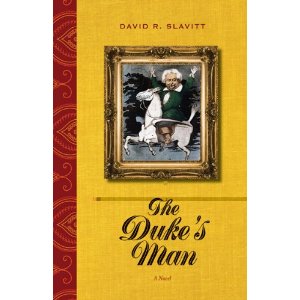 David R. Slavitt: It isn’t a “return,” because I wrote it some ten years ago when I was still writing novels. It took me all this time to find a publisher for it. Lots of editors liked it but shied away because it was limited to readers who had read other books before and had learned something from that experience. It was only a reaction to the dismal market that kept me from starting another novel at least until this one was sold. And now? I doubt that I’ll do any more because this one satisfies me. The chances of my doing anything better are not great. And I have found other ways to occupy my time—large translation projects, like the Mahabharata, which will be coming out in a year or so (also from Northwestern).
David R. Slavitt: It isn’t a “return,” because I wrote it some ten years ago when I was still writing novels. It took me all this time to find a publisher for it. Lots of editors liked it but shied away because it was limited to readers who had read other books before and had learned something from that experience. It was only a reaction to the dismal market that kept me from starting another novel at least until this one was sold. And now? I doubt that I’ll do any more because this one satisfies me. The chances of my doing anything better are not great. And I have found other ways to occupy my time—large translation projects, like the Mahabharata, which will be coming out in a year or so (also from Northwestern).
I don’t remember much about the conception of the novel, but I think the germ of the idea was to take a novel that was “out there” (in the public domain and available online) and futz with it. If I could do that, I could save myself a good deal of typing, which is always the tedious part of novel writing. Eventually, I settled on La Dame de Monsoreau of Dumas, and began playing with it. It got more and more interesting and turned real, which is what one hopes for any novel. Bussy d’Amboise (about whom Chapman had also written) turned from a cartoon into a figure of at least a little depth. It was…fun!
I don’t rule out absolutely any further efforts in the form, but I’d need a weird and improbable offer from some publisher for a short book with a handsome advance. That could probably pique my interest. But a lot of poets get by without writing fiction and lead lives that are no more miserable than they’d be otherwise.
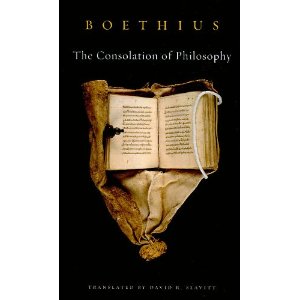 OE: Though no longer writing novels, you've been anything but idle. In the past couple of years, you’ve published several books of translation, including Boethius’ The Consolation of Philosophy (Harvard UP), Dante's La Vita Nuova (Harvard UP), Lucretius’ De Rerum Natura (University of California Press), and Sophocles’ Theban Plays (Yale UP). Some of these projects seem as large as writing a novel (especially your translation of Ludovico Ariosto's Orlando Furioso, which weighs in at nearly 700 pages). Could you tell us a bit about the process and joys of translation, how it differs from writing your own poems and/or novels, and about why you chose the works you have translated?
OE: Though no longer writing novels, you've been anything but idle. In the past couple of years, you’ve published several books of translation, including Boethius’ The Consolation of Philosophy (Harvard UP), Dante's La Vita Nuova (Harvard UP), Lucretius’ De Rerum Natura (University of California Press), and Sophocles’ Theban Plays (Yale UP). Some of these projects seem as large as writing a novel (especially your translation of Ludovico Ariosto's Orlando Furioso, which weighs in at nearly 700 pages). Could you tell us a bit about the process and joys of translation, how it differs from writing your own poems and/or novels, and about why you chose the works you have translated?
DRS: As I get older, I find that I am beginning to learn modesty and am interested in reading the great works of literature. There’s no better way to engage with a book in another language than to translate it, which means more than bringing it into English. In fact, one filters it through his own psyche and sensibility and hears how it resonates in his voice. Another way of putting it is that I am continuing my education and am finding a way to share my exploration with others. I choose works to translate for a variety of reasons. Some, like the Theban Plays or the Metamorphoses of Ovid, I was asked to do. Others, I did because I had a sense that they were not sufficiently well known to the general public (if such a public still exists). I am particularly proud of Ovid’s Poetry of Exile, which classicists dismissed as full of self-pity (while, in fact, they are wonderfully witty performances of a sad man pretending to be sad and, now and then, letting the mask fall so that the feigning turns shockingly real). Milton’s Latin poems are wonderful and very few people know them. Not even English majors at the undergraduate level, are aware of them. Boccaccio’s Latin Eclogues? The poems of Ausonius? Valerius Flaccus? These were things I’d discovered and found to be delightful, and it was the delight that I was trying to communicate.
At Andover, I studied with Dudley Fitts, the first real poet I ever knew personally. He translated things. I assumed that all poets did. This turns out to be incorrect. But as Wilbur says, “a graceful error may correct the cave.” Now that I’m off novels, I find that it’s good to have work on the desk. I’m presently occupied with preparing the final ms of the Mahabharatta for Northwestern, and that runs to more than 900 pages. So I don’t feel unemployed.
OE: Let's go back to the early days of your writing life for a moment. You had published a few literary books when Bernard Geis approached you to write popular novels. These novels (e.g., The Exhibitionist and Vector) sold fabulously but also caused a bit of a scandal in the literary world, causing the likes of Tom Wolfe, among others, to take swipes at you in major newspapers and magazines. Today, many so-called serious writers try their hand at genre novels—such as Michael Chabon with his various genre efforts or Joyce Carol Oates with her horror novels and pseudonymous works. Do you think the outrage was particular to the time you were doing it, or was it that a poet with a somewhat classical bent was writing these books? Otherwise stated: Was it particular to the time or was it particular to you?
DRS: And Day-Lewis wrote mysteries as Nicholas Blake, and Gore Vidal had a pen name for his mysteries.
I always thought the brouhaha was mostly haha. I was at a party once at Hollins and Julia Randall (a very good poet) criticized me for “slumming,” but A. D. Hope (an even better poet) said, “Nonsense. Any way a writer can make money is a good thing.” Indeed, it was even considered odd for a poet to condescend to write novels at all. Red Warren did, and George Garrett, but not many others.
The middle-brows were upset (because they are never sure of themselves) while the high-brows, or at least the upper-middle-brows were amused.
I don’t think it could happen now because nobody takes novelists “seriously” and no contemporary novelist has the clout of a Mailer or a Styron. It’s a post-literate society, etc., etc.
The book sold 4,000,000 copies and put my kids through college, and the tax rates then went as high as 70%. So, je ne regrette rien.
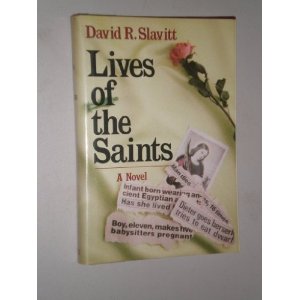 OE: One of the things that most impresses me about your literary output is that you seem able to turn nearly anything into literature. We were just speaking of your time writing popular bestsellers for Bernard Geis, but you also wrote a literary novel, Jo Stern—based loosely on your fellow Geis author, Jacqueline Susann—which takes a more serious and literary approach to the world of high-money publishing and the people who make up the lit biz. And this isn't the only serious book you've written about a writer who cranks out trashy materials to make a living. Lives of the Saints features a narrator who used to be a scholar but after his family dies takes a job at a tabloid writing about alien abductions and three-headed cows—though he ends up finding connections between tabloids and the stories about the lives of saints. I guess my question, after this long lead-up, is something like: What relationship do you see between popular or even hack writing and literary writing, and how do the two inform each other in the world at large and/or in your own work over the years?
OE: One of the things that most impresses me about your literary output is that you seem able to turn nearly anything into literature. We were just speaking of your time writing popular bestsellers for Bernard Geis, but you also wrote a literary novel, Jo Stern—based loosely on your fellow Geis author, Jacqueline Susann—which takes a more serious and literary approach to the world of high-money publishing and the people who make up the lit biz. And this isn't the only serious book you've written about a writer who cranks out trashy materials to make a living. Lives of the Saints features a narrator who used to be a scholar but after his family dies takes a job at a tabloid writing about alien abductions and three-headed cows—though he ends up finding connections between tabloids and the stories about the lives of saints. I guess my question, after this long lead-up, is something like: What relationship do you see between popular or even hack writing and literary writing, and how do the two inform each other in the world at large and/or in your own work over the years?
DRS: Two short answers. One is that serious fiction depends on what Henry James called the truth of coherence, while pop lit depends on the easier truth of correspondence. (My God! Did Judy Garland do that?) The other is that the form of a pop novel is old-fashioned, Galsworthy (but with dirty words). Serious novels do not assume that the form makes any sense anymore. Good characters are not always rewarded in the world and bad ones are not always punished. So writers like Nabokov, Calvino, Nooteboom and others toy with the idea of the novel, making fun of it or turning it on its head.
“Hack” writing is writing for money, and that’s not always bad. Mailer’s Why Are We in Vietnam was written in a few weeks, I believe, to get out of a contract with Putnam, and it is, in many ways, his best book.
George Garrett once suggested that I should take Anagrams, Jo Stern, Lives of the Saints, and maybe Aspects of the Novel or The Cliff and have them brought out together in a big omnibus volume as Novels about Writing. Lovely idea, but no one has been banging on my door.
OE: To keep going along the various genres you've worked in, let's talk about short fiction. By my count, you have only two books of short fiction— Short Stories Are Not Real Life and Get Thee to a Nunnery, the first being, as the title suggests, a collection of short stories, and the second being a pair of novellas. I conclude, perhaps wrongly, from the relatively small number of short fiction books among your 100 titles that short fiction doesn't hold as dear a place in your writerly heart as, for example, poetry and novels do. What joys, what limitations, what aesthetic concerns do you find in the short fiction genre? And why have you spent less time with it than other genres?
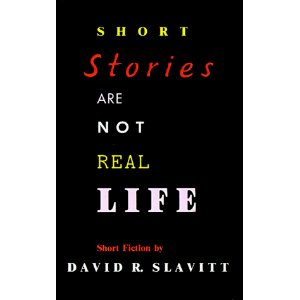 DRS: I like short stories, and I admire them. They have the density of novels and the airiness of poetry. Great short stories are deeply satisfying. I did some to try my hand at it, and I was mostly pleased, but the marketplace is dismal. All the MFAs who haven’t worked up the nerve to try a novel (novels are in fact easier because they have architecture to help you through tough places) start out with short stories. And they’re what we used to call a drug on the market. (Drugs do quite well in the market, however—both legal and illegal.) I’m proud of Short Stories Are Not Real Life. But I’m too old and tender to undergo the disappointment and frustration of rejections by people who don’t know anything.
DRS: I like short stories, and I admire them. They have the density of novels and the airiness of poetry. Great short stories are deeply satisfying. I did some to try my hand at it, and I was mostly pleased, but the marketplace is dismal. All the MFAs who haven’t worked up the nerve to try a novel (novels are in fact easier because they have architecture to help you through tough places) start out with short stories. And they’re what we used to call a drug on the market. (Drugs do quite well in the market, however—both legal and illegal.) I’m proud of Short Stories Are Not Real Life. But I’m too old and tender to undergo the disappointment and frustration of rejections by people who don’t know anything.
Nunnery was an accident. I’d written a play about Romeo and Juliet which never quite got out of workshop. And I turned that into a novella, which publishers really hate because they’re hard to sell. George Garrett suggested that I write another to go with it, and I did this batty version of Measure for Measure set as a western, which was kind of fun (but no one seems to have read Measure for Measure, so there were few readers who could get the joke.)
If some publisher were to guarantee to publish another collection, I’d do one, never mind about the money. But LSU has cut back on fiction and Catbird Press, which did Nunnery, is out of business. The book is available at Amazon, used, for $.01 (plus shipping). What could be clearer?
OE: You've recently been the topic of a Publishers Weekly article honoring you for joining the 100 Club—that group of authors who have 100 books published and/or under contract. What does it feel like looking back on such a long and productive career, and what future projects are you looking forward to? Any ideas for book #101?
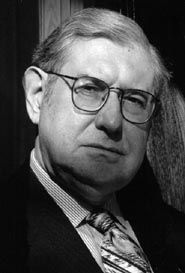
Of course there are new projects. They keep me out of pool halls and bars. In the works are the following: 101. Civil Wars: Poems and Renditions, 2013, LSU Press (finished and contracted for). Publication to be arranged: 102. The Dhammapada of the Buddha (finished and being offered around); 103. Overture: A Memoir (finished a while ago, and languidly offered around by my agent); 104. The Jungle Poems of Leconte de Lisle (finished and, I think, likely to get done, but I don’t like to claim that until there’s a contract); and 105. The Rig Veda (who knows if I’ll ever finish this? It’s a long series of entertaining Hindu hymns. But it’s something to work on.)





